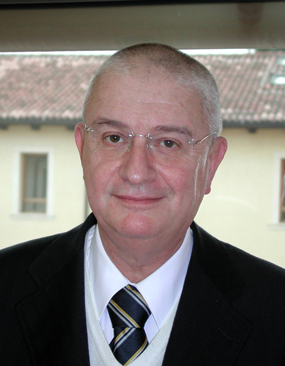Studying at the University of Verona
Here you can find information on the organisational aspects of the Programme, lecture timetables, learning activities and useful contact details for your time at the University, from enrolment to graduation.
Academic calendar
The academic calendar shows the deadlines and scheduled events that are relevant to students, teaching and technical-administrative staff of the University. Public holidays and University closures are also indicated. The academic year normally begins on 1 October each year and ends on 30 September of the following year.
Course calendar
The Academic Calendar sets out the degree programme lecture and exam timetables, as well as the relevant university closure dates..
| Period | From | To |
|---|---|---|
| 1° Periodo di lezioni | Oct 1, 2013 | Dec 13, 2013 |
| Periodo riservato ad eventuali recuperi di lezioni - dicembre 2013 | Dec 14, 2013 | Dec 17, 2013 |
| 2° Periodo di lezioni - febbraio/aprile | Feb 11, 2014 | Apr 14, 2014 |
| 2° Periodo di lezioni - aprile/maggio | Apr 23, 2014 | May 6, 2014 |
| Periodo riservato ad eventuali recuperi di lezioni - maggio 2014 | May 7, 2014 | May 9, 2014 |
| Session | From | To |
|---|---|---|
| Sessione straordinaria 13/14 - studenti f.c. - dicembre 2013 | Dec 18, 2013 | Dec 21, 2013 |
| 1° appello - Sessione invernale 13/14 | Jan 7, 2014 | Jan 13, 2014 |
| 2° appello - Sessione invernale 13/14 | Feb 4, 2014 | Feb 10, 2014 |
| Sessione straordinaria 13/14 - studenti f.c. - aprile 2014 | Apr 15, 2014 | Apr 17, 2014 |
| 1° appello - Sessione estiva 13/14 | May 12, 2014 | May 17, 2014 |
| 2° appello - Sessione estiva 13/14 | Jun 9, 2014 | Jun 14, 2014 |
| 3° appello - Sessione estiva 13/14 | Jul 7, 2014 | Jul 12, 2014 |
| 1° appello - Sessione autunnale 13/14 | Sep 1, 2014 | Sep 6, 2014 |
| 2° appello - Sessione autunnale 13/14 | Sep 24, 2014 | Sep 30, 2014 |
| Session | From | To |
|---|---|---|
| Termine presentazione tesi di laurea - settembre 2013 | Sep 27, 2013 | Sep 27, 2013 |
| Sessione autunnale 13/14 | Oct 21, 2013 | Oct 22, 2013 |
| Termine presentazione tesi di laurea - gennaio 2014 | Jan 10, 2014 | Jan 10, 2014 |
| Sessione invernale 13/14 | Feb 3, 2014 | Feb 3, 2014 |
| Termine presentazione tesi di laurea - febbraio 2014 | Feb 28, 2014 | Feb 28, 2014 |
| Sessione invernale 13/14 - marzo 2014 | Mar 24, 2014 | Mar 26, 2014 |
| Termine presentazione tesi di laurea - giugno 2014 | Jun 9, 2014 | Jun 9, 2014 |
| Sessione estiva 13/14 | Jul 3, 2014 | Jul 4, 2014 |
| Period | From | To |
|---|---|---|
| Festa di Ognissanti | Nov 1, 2013 | Nov 1, 2013 |
| Festa dell'Immacolata Concezione | Dec 8, 2013 | Dec 8, 2013 |
| VACANZE DI NATALE | Dec 22, 2013 | Jan 6, 2014 |
| VACANZE DI PASQUA | Apr 18, 2014 | Apr 22, 2014 |
| Festa della Liberazione | Apr 25, 2014 | Apr 25, 2014 |
| Festa dei lavoratori | May 1, 2014 | May 1, 2014 |
| Festa del S. Patrono S. Zeno | May 21, 2014 | May 21, 2014 |
| Festa della Repubblica | Jun 2, 2014 | Jun 2, 2014 |
Exam calendar
Exam dates and rounds are managed by the relevant Law Teaching and Student Services Unit.
To view all the exam sessions available, please use the Exam dashboard on ESSE3.
If you forgot your login details or have problems logging in, please contact the relevant IT HelpDesk, or check the login details recovery web page.
Should you have any doubts or questions, please check the Enrollment FAQs
Academic staff
 giovanni.alberti@univr.it
giovanni.alberti@univr.it
 mariacaterina.baruffi@univr.it
mariacaterina.baruffi@univr.it

Dalla Massara Tommaso
 tommaso.dallamassara@univr.it
tommaso.dallamassara@univr.it
 +39 045 8028810
+39 045 8028810
 roberto.flor@univr.it
roberto.flor@univr.it
Lehmann Michael
 rita.maggi@univr.it
rita.maggi@univr.it
 martina.menon@univr.it
martina.menon@univr.it

Patrono Paolo
 paolo.patrono@univr.it
paolo.patrono@univr.it
 +39 045 8028813
+39 045 8028813

Peluso Eugenio
 eugenio.peluso@univr.it
eugenio.peluso@univr.it
 045 8028104
045 8028104
 lorenzo.salvatore@univr.it
lorenzo.salvatore@univr.it
Strano Silvana
 silvana.stranoligato@univr.it
silvana.stranoligato@univr.it
 +39 045 8028856
+39 045 8028856
 claudio.tomazzoli@univr.it
claudio.tomazzoli@univr.it
 marcella.veronesi@univr.it
marcella.veronesi@univr.it
Study Plan
The Study Plan includes all modules, teaching and learning activities that each student will need to undertake during their time at the University.
Please select your Study Plan based on your enrollment year.
1° Year
| Modules | Credits | TAF | SSD |
|---|
Principles of economics
Roman Law Institutions
History of Medieval and Modern Law
2° Year activated in the A.Y. 2014/2015
| Modules | Credits | TAF | SSD |
|---|
Un insegnamento a scelta tra i seguenti3° Year activated in the A.Y. 2015/2016
| Modules | Credits | TAF | SSD |
|---|
Terminologia giuridica di una lingua straniera4° Year activated in the A.Y. 2016/2017
| Modules | Credits | TAF | SSD |
|---|
Un insegnamento a scelta tra i seguenti5° Year activated in the A.Y. 2017/2018
| Modules | Credits | TAF | SSD |
|---|
Cinque insegnamenti a scelta tra i seguenti| Modules | Credits | TAF | SSD |
|---|
Principles of economics
Roman Law Institutions
History of Medieval and Modern Law
| Modules | Credits | TAF | SSD |
|---|
Un insegnamento a scelta tra i seguenti| Modules | Credits | TAF | SSD |
|---|
Terminologia giuridica di una lingua straniera| Modules | Credits | TAF | SSD |
|---|
Un insegnamento a scelta tra i seguenti| Modules | Credits | TAF | SSD |
|---|
Cinque insegnamenti a scelta tra i seguentiLegend | Type of training activity (TTA)
TAF (Type of Educational Activity) All courses and activities are classified into different types of educational activities, indicated by a letter.
Canon Law (2017/2018)
Teaching code
4S001384
Teacher
Coordinator
Credits
6
Language
Italian
Scientific Disciplinary Sector (SSD)
IUS/11 - ECCLESIASTICAL AND CANON LAW
Period
1° periodo di lezioni dal Oct 2, 2017 al Dec 15, 2017.
Learning outcomes
The course aims to provide essential tools learning and analysis about the two-thousand years old juridical order of the Catholic Church. Despite its strong originality in comparison to the world of the secular laws, the law of the Church has played a significant role in the creation and the development of the european legal culture; many institutions and many solutions of the juridical problems adopted by the States laws are derived from the canonical models.
At the end of the course the student will be able:
- to know and understand the fundamental principles, institutes and rules of canon law;
- to evaluate essential profiles of comparison between the law of the Church and secular legal systems, both in historical evolution and in current legislation;
- to know how to set up practical issues of relationships between the rules of canon law and the rules of secular legal systems.
Program
PROGRAMMA
The course aims at explaining thoroughly canon law’s sources of divine right and sources of human right, fundamental rights of the faithful and government structures of the universal Church and of the particular Churches. A special importance will be given to canon law on marriage, wich obtains civile power in the Concordat between Italy and the Holy See.
• Sources of Canon law: divine right and human right
• The canonical condition of the christian faithful: clerics, lay faithful, religious.
• The power of governance and the hierarchical constitution of the Church
• The ecclesiastical office
• Government of the universal Church. The Roman Pontiff and the College of Bishops.
• Government of the particular Churches. The diocese. The parish
• The temporal goods of the Church.
• The penal regulation in ecclesiastical law.
• The marriage. Cases to declare the nullity of marriage.
DIDACTIC METHODS
The teaching consists in:
• lectures on the course topics
• analysis of materials placed on e-earning platform and discussed during lectures, in order to foster a critical approach by students
• conferences by Italian and foreign experts, so as to provide students with different approaches to the subject
During the academic year the teacher receives students at the times indicated in web pages, no need to set a specific date
| Author | Title | Publishing house | Year | ISBN | Notes |
|---|---|---|---|---|---|
| ARROBA CONDE M. J. - RIONDINO M. | Introduzione al diritto canonico | Le Monnier Università | 2015 | 9788800746243 | |
| DALLA TORRE G. | Lezioni di diritto canonico (Edizione 5) | Giappichelli | 2018 | 9788892114548 | |
| CARDIA C. | Principi di diritto ecclesiastico. Tradizione europea legislazione italiana (Edizione 5) | Giappichelli | 2019 | 9788892130616 | pp. 1-361 |
Examination Methods
Knowledge and skills provided will be verified with an final examination on the whole program.
A) Students attending classes: they can choose a written examination. Students will be required to answer to three open-ended questions. They can prepare for the examination on lecture notes
B) Students not attending classes: oral examination.
Grades will be expressed in /30 taking into account knowledge of the subject, accuracy in response, quality of the legal reasoning and use of the correct legal terminology.
Teaching materials e documents
-
 programma e testi consigliati (ita/ingl)
(msword, it, 54 KB, 12/06/18)
programma e testi consigliati (ita/ingl)
(msword, it, 54 KB, 12/06/18)
Type D and Type F activities
Modules not yet included
Career prospects
Module/Programme news
News for students
There you will find information, resources and services useful during your time at the University (Student’s exam record, your study plan on ESSE3, Distance Learning courses, university email account, office forms, administrative procedures, etc.). You can log into MyUnivr with your GIA login details: only in this way will you be able to receive notification of all the notices from your teachers and your secretariat via email and soon also via the Univr app.
Language skills
Graduation
Internships
Internships are aimed at enabling students to gain direct knowledge of the world of work and to acquire specific professional skills.
Internships are carried out under the responsibility of an individual lecturer, and can be carried out in professional firms, public administration bodies and companies recognised by the University of Verona.
Any CFU credits gained by doing internships will be recognised and recorded by the University in accordance with the relevant University regulations in force (Regolamento d’Ateneo per il riconoscimento dei crediti maturati negli stage universitari).
For further information on internships, please go to: https://www.univr.it/it/i-nostri-servizi/stage-e-tirocini.














































